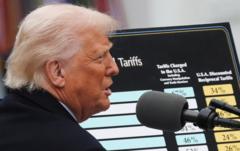Yoon Suk Yeol was ousted by the Constitutional Court and now faces serious legal challenges that could end his political aspirations permanently.
**Yoon Suk Yeol's Political Struggles Continue Amid Impeachment Fallout**

**Yoon Suk Yeol's Political Struggles Continue Amid Impeachment Fallout**
The former South Korean president grapples with a potential insurrection charge following his controversial martial law declaration.
Yoon Suk Yeol, South Korea's ex-president, may have seen his political career come to an end, but legal woes linger as he contends with criminal charges stemming from his insurrection allegations linked to a brief martial law declaration. The Constitutional Court ousted Yoon from office on Friday, yet the scrutiny does not cease there. Currently, he is embroiled in ongoing trials initiated due to his December 3 order that led to the banning of political activities, coupled with orders for military commanders to forcibly breach the National Assembly.
Prosecutors assert that Yoon's actions constituted insurrection, citing his controversial directives to use extreme measures in removing lawmakers. Yoon has staunchly denied these allegations, arguing he took drastic steps to shield the nation from what he described as "anti-state forces" that had infiltrated the government.
Despite the heavy weight of these accusations, Yoon's fate may remain uncertain. If the court deems him guilty, he risks a considerable prison sentence reminiscent of past South Korean presidents, such as Park Geun-hye, who was convicted on bribery charges but received a presidential pardon after serving less than five years of her sentence.
The Constitutional Court's ruling that affirmed his impeachment stands separate from the ongoing criminal case and does not influence its outcome. As Yoon's saga unfolds, many South Koreans await to see how this will ultimately reshape their political landscape.
Prosecutors assert that Yoon's actions constituted insurrection, citing his controversial directives to use extreme measures in removing lawmakers. Yoon has staunchly denied these allegations, arguing he took drastic steps to shield the nation from what he described as "anti-state forces" that had infiltrated the government.
Despite the heavy weight of these accusations, Yoon's fate may remain uncertain. If the court deems him guilty, he risks a considerable prison sentence reminiscent of past South Korean presidents, such as Park Geun-hye, who was convicted on bribery charges but received a presidential pardon after serving less than five years of her sentence.
The Constitutional Court's ruling that affirmed his impeachment stands separate from the ongoing criminal case and does not influence its outcome. As Yoon's saga unfolds, many South Koreans await to see how this will ultimately reshape their political landscape.



















